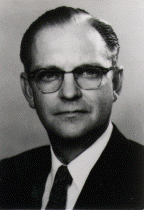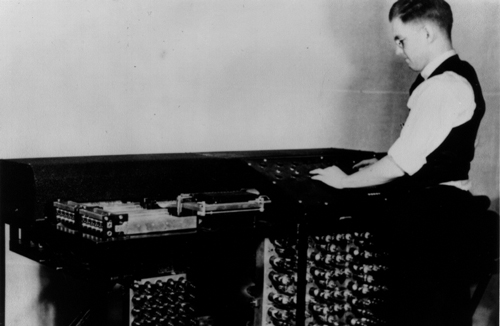
Clifford Berry Biography
CLIFFORD EDWARD BERRY was born in Gladbrook, Iowa on 19 April 1918 to Fred Gordon Berry and Grace Strohm. He was the oldest of four children.
When Clifford was a small child, his father had an electrical appliance and repair store in Gladbrook, Iowa. At the store, Fred tinkered with different electrical projects. By far the greatest of his projects was a radio--the first radio in Gladbrook. This prompted a stream of town visitors to get a glimpse at the machine. Fred taught his son about the construction of the radio, and Clifford started tinkering with electricity and radio. When he was eleven, he built his first ham radio under his father's supervision.
From an early age, Clifford was a precocious child. His second grade teacher and the school principal suggested to his parents that he be moved a grade ahead. Fred and Grace Berry resisted for two years, until the principal argued again that Clifford needed to be challenged. He was allowed to skip the fourth grade.
When he was 11 years old, the family moved to the small town of Marengo, Iowa, where his father had accepted a position as manager of the Marengo office for the Iowa Power Company. During Clifford's sophomore year at Marengo High School, where he continued to excel academically, his father was shot and killed by an employee who had been fired.
At Fred Berry's death, Grace decided the family would remain in Marengo until Clifford was ready to attend Iowa State College. At that time, they would all move to Ames, home of the college. From as early as his family could remember, Clifford had aspired to study electrical engineering.
From the beginning of his college years, his record as a student of electrical engineering was impressive. He received his B.S. in Electrical Engineering in 1939. Professor Harold Anderson was a professor of electrical engineering and one of John Vincent Atanasoff's best friends. He was also one of the many people that was impressed by Clifford Berry's brilliance and capacity. Thus, when Atanasoff asked him if he could recommend a graduate student in electrical engineering to assist him in his computing machine project, Professor Anderson immediately thought of Clifford Berry. When Clifford called JVA to tell him that he was interested in the job, they spoke about the possibilities, and JVA realized that he was dealing with an unusually perceptive and knowledgable young man.
 The construction of the prototype moved ahead with great speed and as soon as it was completed it worked well. It settled their doubts that an electronic computer could be built. In December 1939 a demonstration of the prototype to Iowa State College officials convinced them that JVA’s project was worthy of a grant of $850 from the Iowa State College Research Council to construct a full-scale machine capable of solving systems of equations. Work on that machine started after the Christmas holidays. The following spring, JVA and Berry sent materials and drawings of the ABC to Chicago patent lawyer Richard R. Trexler, who had been hired by Iowa State College to give them advice on how to protect their invention.
The construction of the prototype moved ahead with great speed and as soon as it was completed it worked well. It settled their doubts that an electronic computer could be built. In December 1939 a demonstration of the prototype to Iowa State College officials convinced them that JVA’s project was worthy of a grant of $850 from the Iowa State College Research Council to construct a full-scale machine capable of solving systems of equations. Work on that machine started after the Christmas holidays. The following spring, JVA and Berry sent materials and drawings of the ABC to Chicago patent lawyer Richard R. Trexler, who had been hired by Iowa State College to give them advice on how to protect their invention.
It was while Clifford was a graduate student in physics and was working as a graduate assistant on the ABC that he met Martha Jean Reed, also an Iowa State graduate who was working in the Physics Department as JVA’s secretary. The couple wed in May 30, 1942 in Ames, Iowa. They had two children, Carol and David.
Berry received his M.S. in Physics in 1941. After their marriage in 1942, the couple left Iowa for a defense-related job Berry had been offered with Consolidated Engineering Corporation in Pasadena, California. Under a special arrangement with Iowa State, he did his research in absentia and completed the requirements for the Ph.D. (in physics) in 1948, while employed by C.E.C.
In 1948 he received the doctorate after presenting a thesis titled The Effects of Initial Energies on Mass Spectra. He became Chief Physicist at C.E.C. in 1949 and Assistant Director of Research in 1952. He was made Director of Engineering of the Analytical and Control Division in 1959 and also served as its Technical Director.
In early October 1963 he left C.E.C. to become Manager of Advanced Development at the Vacuum-Electronics Corporation in Plainview, New York. He died suddenly on October 30, 1963, before his family had a chance to join him in New York.
Dr. Berry was issued 19 patents in the area of mass spectrometry, 11 patents in various areas of vacuum and electronics and, at the time of his death, had 13 patents pending. He was a member of the American Physical Society, American Vacuum Society, American Association for the Advancement of Science, Sigma Xi, Eta Kappa Nu, Pi Mu Epsilon, and Phi Kappa Phi.

